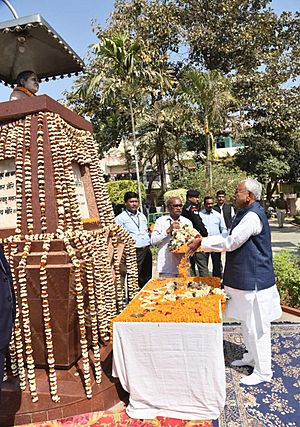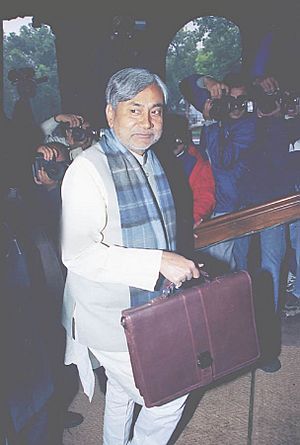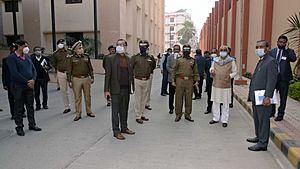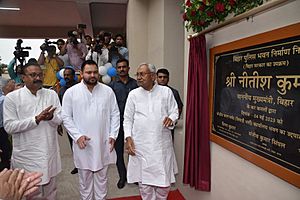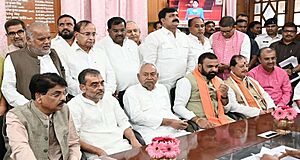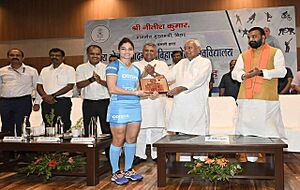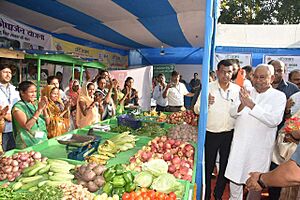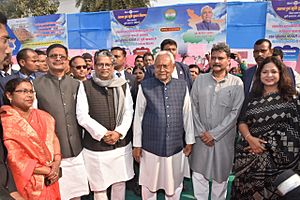Nitish Kumar facts for kids
Quick facts for kids
Nitish Kumar
|
|||||||||||||||||||||||||||||||||||||||||||||||||
|---|---|---|---|---|---|---|---|---|---|---|---|---|---|---|---|---|---|---|---|---|---|---|---|---|---|---|---|---|---|---|---|---|---|---|---|---|---|---|---|---|---|---|---|---|---|---|---|---|---|
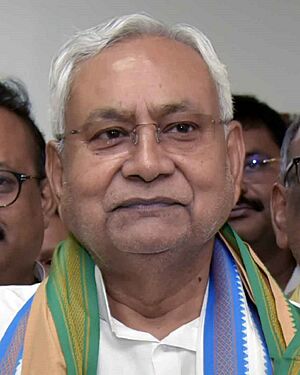
Kumar in 2024
|
|||||||||||||||||||||||||||||||||||||||||||||||||
| 22nd Chief Minister of Bihar | |||||||||||||||||||||||||||||||||||||||||||||||||
| Assumed office 22 February 2015 |
|||||||||||||||||||||||||||||||||||||||||||||||||
| Governor |
List
|
||||||||||||||||||||||||||||||||||||||||||||||||
| Preceded by | Jitan Ram Manjhi | ||||||||||||||||||||||||||||||||||||||||||||||||
| In office 24 November 2005 – 20 May 2014 |
|||||||||||||||||||||||||||||||||||||||||||||||||
| Governor | |||||||||||||||||||||||||||||||||||||||||||||||||
| Preceded by | President's rule | ||||||||||||||||||||||||||||||||||||||||||||||||
| Succeeded by | Jitan Ram Manjhi | ||||||||||||||||||||||||||||||||||||||||||||||||
| In office 3 March 2000 – 10 March 2000 |
|||||||||||||||||||||||||||||||||||||||||||||||||
| Governor | V. C. Pande | ||||||||||||||||||||||||||||||||||||||||||||||||
| Preceded by | Rabri Devi | ||||||||||||||||||||||||||||||||||||||||||||||||
| Succeeded by | Rabri Devi | ||||||||||||||||||||||||||||||||||||||||||||||||
| 27th Union Minister of Railways | |||||||||||||||||||||||||||||||||||||||||||||||||
| In office 20 March 2001 – 21 May 2004 |
|||||||||||||||||||||||||||||||||||||||||||||||||
| President | |||||||||||||||||||||||||||||||||||||||||||||||||
| Prime Minister | Atal Bihari Vajpayee | ||||||||||||||||||||||||||||||||||||||||||||||||
| Preceded by | Mamata Banerjee | ||||||||||||||||||||||||||||||||||||||||||||||||
| Succeeded by | Lalu Prasad Yadav | ||||||||||||||||||||||||||||||||||||||||||||||||
| In office 19 March 1998 – 5 August 1999 |
|||||||||||||||||||||||||||||||||||||||||||||||||
| President | K. R. Narayanan | ||||||||||||||||||||||||||||||||||||||||||||||||
| Prime Minister | Atal Bihari Vajpayee | ||||||||||||||||||||||||||||||||||||||||||||||||
| Preceded by | Ram Vilas Paswan | ||||||||||||||||||||||||||||||||||||||||||||||||
| Succeeded by | Mamata Banerjee | ||||||||||||||||||||||||||||||||||||||||||||||||
| 24th Union Minister of Agriculture | |||||||||||||||||||||||||||||||||||||||||||||||||
| In office 27 May 2000 – 21 July 2001 |
|||||||||||||||||||||||||||||||||||||||||||||||||
| President | K. R. Narayanan | ||||||||||||||||||||||||||||||||||||||||||||||||
| Prime Minister | Atal Bihari Vajpayee | ||||||||||||||||||||||||||||||||||||||||||||||||
| Preceded by | Sunder Lal Patwa | ||||||||||||||||||||||||||||||||||||||||||||||||
| Succeeded by | Ajit Singh | ||||||||||||||||||||||||||||||||||||||||||||||||
| In office 22 November 1999 – 3 March 2000 |
|||||||||||||||||||||||||||||||||||||||||||||||||
| President | K. R. Narayanan | ||||||||||||||||||||||||||||||||||||||||||||||||
| Prime Minister | Atal Bihari Vajpayee | ||||||||||||||||||||||||||||||||||||||||||||||||
| Preceded by | Atal Bihari Vajpayee | ||||||||||||||||||||||||||||||||||||||||||||||||
| Succeeded by | Sunder Lal Patwa | ||||||||||||||||||||||||||||||||||||||||||||||||
| 11th Union Minister of Surface Transport | |||||||||||||||||||||||||||||||||||||||||||||||||
| In office 13 October 1999 – 22 November 1999 |
|||||||||||||||||||||||||||||||||||||||||||||||||
| President | K. R. Narayanan | ||||||||||||||||||||||||||||||||||||||||||||||||
| Prime Minister | Atal Bihari Vajpayee | ||||||||||||||||||||||||||||||||||||||||||||||||
| Preceded by | M. Thambidurai | ||||||||||||||||||||||||||||||||||||||||||||||||
| Succeeded by | Jaswant Singh | ||||||||||||||||||||||||||||||||||||||||||||||||
| In office 14 April 1998 – 5 August 1999 |
|||||||||||||||||||||||||||||||||||||||||||||||||
| President | K. R. Narayanan | ||||||||||||||||||||||||||||||||||||||||||||||||
| Prime Minister | Atal Bihari Vajpayee | ||||||||||||||||||||||||||||||||||||||||||||||||
| Preceded by | Jaswant Singh | ||||||||||||||||||||||||||||||||||||||||||||||||
| Succeeded by | Rajnath Singh | ||||||||||||||||||||||||||||||||||||||||||||||||
| 24th Union Minister of State of Agriculture | |||||||||||||||||||||||||||||||||||||||||||||||||
| In office 23 April 1990 – 10 November 1990 |
|||||||||||||||||||||||||||||||||||||||||||||||||
| President | Ramaswamy Venkataraman | ||||||||||||||||||||||||||||||||||||||||||||||||
| Prime Minister | V. P. Singh | ||||||||||||||||||||||||||||||||||||||||||||||||
| Minister | Devi Lal V. P. Singh |
||||||||||||||||||||||||||||||||||||||||||||||||
| Succeeded by | Upendra Nath Verma | ||||||||||||||||||||||||||||||||||||||||||||||||
| Preceded by | Janardhana Poojary | ||||||||||||||||||||||||||||||||||||||||||||||||
|
|||||||||||||||||||||||||||||||||||||||||||||||||
|
|||||||||||||||||||||||||||||||||||||||||||||||||
| Personal details | |||||||||||||||||||||||||||||||||||||||||||||||||
| Born | 1 March 1951 Bakhtiarpur, Bihar, India |
||||||||||||||||||||||||||||||||||||||||||||||||
| Political party | Janata Dal (United) (2005–present) | ||||||||||||||||||||||||||||||||||||||||||||||||
| Other political affiliations |
National Democratic Alliance (2024–present; 2017–2022; 1999–2013) Indian National Developmental Inclusive Alliance (2023–2024) United Progressive Alliance (2022–2023; 2015–2017) Samata Party (until 2005) Janata Dal (1989–1994) |
||||||||||||||||||||||||||||||||||||||||||||||||
| Spouse |
Manju Sinha
(m. 1973; died 2007) |
||||||||||||||||||||||||||||||||||||||||||||||||
| Children | 1 | ||||||||||||||||||||||||||||||||||||||||||||||||
| Parents |
|
||||||||||||||||||||||||||||||||||||||||||||||||
| Alma mater | National Institute of Technology, Patna (BE) | ||||||||||||||||||||||||||||||||||||||||||||||||
| Signature |  |
||||||||||||||||||||||||||||||||||||||||||||||||
| Source: [1] | |||||||||||||||||||||||||||||||||||||||||||||||||
Nitish Kumar (born 1 March 1951) is an important Indian politician. He has served as the Chief Minister of Bihar many times. He first became Chief Minister in 2000. He has held this top position for a total of nine terms, making him Bihar's longest-serving Chief Minister.
He is the leader of the Janata Dal (United) political party. Before this, he was part of the Samata Party and the Janata Dal. Nitish Kumar started his political journey as a member of the Janata Dal. He became a Member of the Legislative Assembly (MLA) in 1985. In 1994, he helped create the Samata Party with George Fernandes.
In 1996, he was elected to the Lok Sabha, which is one of India's main parliamentary houses. He served as a Union Minister in the government led by Atal Bihari Vajpayee. His party joined the National Democratic Alliance (NDA). In 2003, his party merged with another to form the Janata Dal (United), and he became its leader.
In 2005, the NDA, with Nitish Kumar as its leader, won the elections in Bihar. He became Chief Minister, leading a government with the Bharatiya Janata Party (BJP). In 2013, he left the BJP alliance. He then formed a new group called the Mahagathbandhan (Grand Alliance) with other parties like the Rashtriya Janata Dal (RJD) and Indian National Congress.
In 2014, he resigned as Chief Minister after his party lost many seats in the national elections. Jitan Ram Manjhi took over. However, Nitish Kumar returned as Chief Minister in 2015 after a political situation led to Manjhi's resignation. The Grand Alliance then won the state elections later that year. In 2017, he left the RJD alliance and rejoined the NDA. In 2022, he again left the NDA and rejoined the Mahagathbandhan. In January 2024, he once more left the Mahagathbandhan and rejoined the NDA.
Contents
Early Life and Education
Nitish Kumar was born on 1 March 1951, in Bakhtiarpur, Bihar. His mother was Parmeshwari Devi, and his father was Kaviraj Ram Lakhan Singh, who was an ayurvedic doctor. Nitish belongs to the Kurmi community, which is a farming caste. His nickname is 'Munna'. His family village is Kalyan Bigha, located in the Nalanda district.
He studied Electrical Engineering at Bihar College of Engineering (now NIT Patna) and graduated in 1972. He briefly worked for the Bihar State Electricity Board before fully entering politics. He married Manju Kumari Sinha on 22 February 1973. They had one son. Manju Sinha passed away in 2007.
Political Journey
Nitish Kumar is known as a socialist politician. In his early political days, he worked with leaders like Ram Manohar Lohia and Jayaprakash Narayan. He joined Jayaprakash Narayan's movement between 1974 and 1977.
He first won an election to the state assembly from Harnaut in 1985. Later, he became a Member of Parliament (MP) in the Lok Sabha from Barh in 1996.
The Janata Dal party faced many changes. In 1994, Nitish Kumar and George Fernandes formed the Samata Party. Later, in 2003, the Samata Party merged with another group to form the Janata Dal (United) (JD(U)). This merger helped create a stronger political force.
In the 1999 national elections, the BJP and JD(U) alliance performed well in Bihar. This led many to believe that the government led by Lalu Prasad Yadav and Rabri Devi would end. However, the RJD managed to form the government again in 2000.
Roles as Union Minister
Nitish Kumar served as a Union Minister in the national government under Prime Minister Atal Bihari Vajpayee. He was briefly the Union Minister for Railways and Minister for Surface Transport. He also served as the Minister for Agriculture in 1998–99.
In August 1999, he resigned as Railway Minister after a train accident, taking responsibility for it. During his time as Railway Minister, he introduced important changes. These included internet ticket booking in 2002 and the "tatkal scheme" for instant ticket booking.
From 2001 to 2004, he was again the Union Minister for Railways. In the 2004 national elections, he won from Nalanda but lost from his traditional area, Barh.
Key Initiatives as Chief Minister
Improving Law and Order
When Nitish Kumar first became Chief Minister, one of his biggest challenges was improving law and order. There were many criminal groups active, and kidnappings were common. He introduced the Arms Act and set up special courts to quickly punish criminals. This made it easier for the police to arrest offenders and reduced the use of illegal weapons.
He also created a special police unit called the Special Auxiliary Police (SAP). This unit was made up of retired army officials and soldiers. They helped deal with challenges like left-wing extremism in some areas. These trained commandos were very helpful for the Bihar Police.
To fight corruption, he formed a "Special Vigilance Unit" (SVU). This group investigated serious offenses by high-level government officials. A law called the Bihar Special Court Act 2009 was passed to allow the government to take over the property of accused officials during trials. The SVU was successful in tackling corruption.
He also reformed the police recruitment process to ensure only qualified candidates were selected. This helped prevent corruption and favoritism in hiring. These efforts led to a big drop in crime rates. Many criminals either left the state or stopped their activities.
His government also worked to stop criminals from using cell phones in jails by installing Mobile phone jammers. They also transferred dangerous criminals to more secure prisons to break their links with outside groups. Former police officials have praised Nitish Kumar for significantly improving law and order in Bihar.
Empowering Backward Communities
Nitish Kumar focused on supporting the 'Extremely Backward Castes' (EBCs). These are communities that are less powerful than other backward groups. His government introduced a 50% reservation for women in local self-governance bodies, known as Panchayati Raj institutions. Within this, 20% of seats were reserved for EBC members.
These reservations greatly increased the number of EBC representatives in local government. This helped these communities gain more political power. His government also announced a plan for 50% reservation in state judicial services, with 21% for EBCs. This aimed to bring more people from these groups into the lower courts.
To connect more with EBCs, Nitish Kumar promoted EBC leaders within his party. For example, he supported Chandeshwar Prasad from the Kahar caste, who later won an election from a constituency usually dominated by upper castes. This showed his commitment to empowering these communities.
Promoting Sports
On 29 August 2024, Nitish Kumar opened the Rajgir Sports Complex and Cricket Stadium. This huge project cost about 750 crore rupees (around 90 million US dollars). The complex covers 90 acres and has facilities for over 23 different sports.
This project was built to help athletes in Bihar get better training and improve their performance in international events. It includes a main cricket stadium, eight smaller stadiums, a sports library, and training academies. Soon after it opened, the Asian Hockey Federation announced that the Rajgir Sports Academy would host the Asian Women's Hockey Championship in 2024.
Jeevika Project for Rural Livelihood
Nitish Kumar's government started the Jeevika project in 2006-07, also known as the Bihar Rural Livelihood Project. This project received support from the World Bank. Its goal was to help women in rural areas earn a living.
Under this project, bank accounts were opened for rural women, and they received loans to start small businesses. Women were trained and given work based on their skills, often through small groups called cooperatives. These women, known as "Jeevika Didis," later expanded their work to include providing financial services in villages.
His government also launched 'Didi Ki Rasoi' (Sister's Kitchen). This project involved women running kitchens that provided fresh, homemade food to schools, hospitals, and government offices. Other states like Gujarat and Karnataka have also adopted similar ideas from Bihar's successful programs.
Terms as Chief Minister of Bihar
Nitish Kumar has been the Chief Minister of Bihar many times. During his time in office, he has focused on development. He hired over 100,000 school teachers, made sure doctors worked in health centers, brought electricity to many villages, and built roads. He also helped reduce female illiteracy by half and improved the state's economy.
First Term (2000)
In March 2000, Nitish Kumar became Chief Minister of Bihar for the first time. He was a member of the Samata Party. However, his alliance did not have enough support in the assembly, so he resigned after only seven days.
Second Term (2005–2010)
After winning the 2005 Bihar Assembly elections, Nitish Kumar became Chief Minister. He focused on both social justice and development for the state.
Third Term (2010–2014)
Nitish Kumar's government started programs like giving bicycles to girls who stayed in school. This greatly increased the number of girls attending school and reduced dropout rates.
In the 2010 state elections, his party and its allies, the Bharatiya Janata Party, won by a large margin. He became Chief Minister again. These elections were known for high voter turnout, especially among women and young people, and were considered very fair.
On 17 May 2014, he resigned as Chief Minister. This was after his party performed poorly in the national elections, winning only 2 seats compared to 20 before. He took responsibility for the results, and Jitan Ram Manjhi took his place.
Fourth Term (2015)
Nitish Kumar served a short fourth term in 2015. He became Chief Minister again on 22 February 2015. His party, JD(U), formed the Mahagathbandhan (Grand Alliance) with the RJD and Congress to challenge the BJP in the upcoming state elections.
Fifth Term (2015–2017)
Nitish Kumar campaigned strongly for the Grand Alliance. The Grand Alliance won the Assembly election by a large margin. Nitish Kumar was sworn in as Chief Minister on 20 November 2015 for a fifth time. Tejashwi Yadav became the Deputy Chief Minister.
Sixth Term (2017–2020)
When corruption allegations were made against Tejashwi Yadav, the Deputy Chief Minister, Nitish Kumar asked him to resign. When the Rashtriya Janata Dal refused, Kumar resigned on 26 July 2017. This ended the Grand Alliance. He then quickly rejoined the NDA and returned to power within a few hours.
Seventh Term (2020–2022)
Nitish Kumar highlighted his government's achievements over 15 years. His alliance, the NDA, won a majority in the Legislative Assembly in the 2020 state elections. He was sworn in as Bihar Chief Minister for the seventh time.
On 9 August 2022, Nitish Kumar resigned as Chief Minister and left the NDA. He announced that his party had rejoined the Mahagathbandhan.
Eighth Term (2022–2024)
On 9 August 2022, Nitish Kumar broke his alliance with the BJP. He resigned as Chief Minister and rejoined the Mahagathbandhan, which included the RJD, INC, and other parties. On 10 August, he was sworn in as Chief Minister for the eighth time. The Bihar caste-based survey 2023 began during this term.
In early 2023, Kumar started his "Samadhan Yatra," a campaign to visit different parts of Bihar. He checked on the progress of government development projects and worked to speed up their implementation. He was often joined by his deputy, Tejashwi Yadav.
In November 2023, the Bihar Assembly faced protests after Nitish Kumar made some remarks about women's education. He later expressed regret for any offense caused and apologized, reaffirming his support for women's education and empowerment.
On 28 January 2024, Kumar resigned as Chief Minister and rejoined the NDA.
Ninth Term (2024–Present)
On 28 January 2024, Nitish Kumar resigned as Chief Minister. He broke the Mahagathbandhan alliance and rejoined the BJP-led NDA. On the same day, he was sworn in as Chief Minister for the ninth time.
Books About Nitish Kumar
- Sankarshan Thakur wrote a book titled Single Man: The Life and Times of Nitish Kumar of Bihar.
- Arun Sinha wrote a book called Nitish Kumar and The Rise of Bihar.
Awards and Recognition
- Anuvrat Puraskar, from a Jain organization, for banning alcohol in Bihar, 2017.
- JP Memorial Award, 2013.
- Ranked 77th in Foreign Policy Magazine's top 100 global thinkers in 2012.
- Sir Jehangir Ghandy Medal for Industrial & Social Peace, 2011.
- "MSN Indian of the Year 2010".
- NDTV Indian of the Year – Politics, 2010.
- Forbes' "India's Person of the Year", 2010.
- CNN-IBN "Indian of the Year Award" – Politics, 2010.
- NDTV Indian of the Year – Politics, 2009.
- Economics Times "Business Reformer of the Year 2009".
- Polio Eradication Championship Award, 2009, by Rotary International.
- CNN-IBN Great Indian of the Year – Politics, 2008.
- The Best Chief Minister, according to a 2007 poll by CNN-IBN and Hindustan Times.
Important Roles Held
Nitish Kumar has held many important positions throughout his political career:
- Member of the Bihar Legislative Assembly (state assembly) from 1985–1989.
- Member of the Lok Sabha (national parliament) for six terms, starting in 1989.
- Union Minister of State for Agriculture and Co-operation (1990).
- Union Cabinet Minister for Railways (1998–1999, 2001–2004).
- Union Cabinet Minister for Surface Transport (1998–1999, 1999).
- Union Cabinet Minister for Agriculture (1999–2000, 2000–2001).
- Chief Minister of Bihar for multiple terms, starting in 2000.
- Member of the Bihar Vidhan Parishad (state legislative council) for four terms, starting in 2006.
See also
- List of politicians from Bihar
- Ganga Water Lift Project
 | Lonnie Johnson |
 | Granville Woods |
 | Lewis Howard Latimer |
 | James West |


